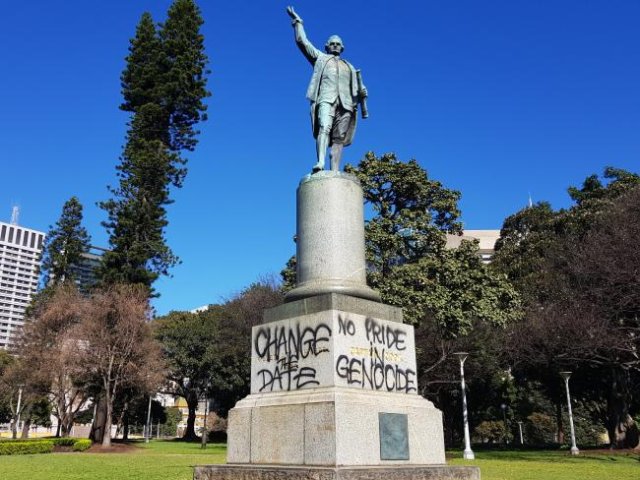
Thanks to a passing reference in this column only a week ago about statues and other monuments featuring colonial "founding fathers" that participated in massacres of Aboriginal people and other wrongs, I got lumped into Andrew Bolt's collection of "statue haters".
Others in the corporate media suggested that even having the discussion was like Nazi book burning. Right. And we're the ones disrespecting history!
Prime Minister Malcolm Turnbull took the prize for idiocy by saying that some alternative signage attached to the Captain Cook memorial in Sydney would amount to "Stalinism". Logically then, people in Eastern Europe who took down statues of Josef Stalin after his death are also Stalinists.
The discussion about how we remember some of these colonial figures, while prompted by the battle over Confederate statues in the US, inevitably flows from our own debate about January 26. If you accept that celebrating the date as Australia Day is hurtful to many Indigenous people because it marked the beginning of their violent dispossession, then it follows there are some important people who sanctioned or participated in that violence.
Conservatives do not want to have that discussion. It is not us that are trying to deny Australia's history. They want to put all the bad things in a steel box and throw away the key so we can just get on with celebrating how great we are.
The massacres and other atrocities that happened during Australia's Frontier War are not ancient history, especially not if you're a descendant of the victims and the Australian state and most of society barely acknowledges the fact. The Coniston Masscre of 1928 in the Northern Territory is still within living memory. It is significant for being the last officially sanctioned massacre. Mounted police killed between 60 and 110 people and all were acquitted of wrong-doing.
I haven't heard any commentator sympathetic to Aboriginal Australia calling for every single colonial era statue to be pulled down. Some can stay where they are, while others commemorating those that carried out the most odious acts and which are located in the most insensitive of places better belong in museums along with an interpretative explanation.
In some locations an alternative plaque might be sufficient or some additional monuments telling the Indigenous story would be appropriate. In its August 30 editorial The West Australian was gracious enough to approve this last possibility while still trying to hold the line. Here's a thought, let's start the discussion by talking with Indigenous people about how they feel, and not with what offended white folks' pride can tolerate.
I had an interesting discussion with 6PR morning talk show host Gareth Parker early in the week. I'm not a regular listener so was pleasantly surprised that he wasn't quite the full-throttle shock-jock I was expecting. At one point when trying to explain that statues aren't the immovable timeless things we sometimes imagine, I mentioned that authorities across Australia have removed artworks by and plaques hailing Rolf Harris.
Parker asked if I was seriously comparing the acts of some of our "founding fathers" to the crimes committed by Harris. He seemed genuinely shocked. I was shocked that he was shocked, the conversation stalled a little.
I guess it goes to show just how little most Australian know about the extensive and blood curdling savagery that happened along the Frontier. There's not much to be gained by trying to rank every atrocity or wrong-doing from worst to least bad. But abhorrent though his crimes may be, Harris has not murdered dozens of people. The passage of time might change how we respond to such crimes, but it doesn't change the essential wrong involved.
Australia is not the only colonial-settler state with a history like this, but the official collective denial about it really is very marked. After nearly three decades of war the British and Maori signed the Treaty of Waitangi. Canada has also signed treaties with its Indigenous people. While in each case the deck was stacked against Indigenous people, their existence and sovereignty is at least notionally recognised.
The US made and broke many treaties as it expanded; it even had a whole film industry dedicated to glorifying its frontier wars. But in Australia some want to keep it all locked up in that steel box because to open it would be "divisive". Or to be more accurate, would expose the divisions that never went away.
In the last year I've been lucky enough to get to know Indigenous activist Corina Abraham. She's a Bibbulman Yorga and is directly related to Calyute, one of the few survivors of the Pinjarra Massacre. Historians put the number killed at 25–30, although Corina reckons the number might be a lot higher.
The leader of the white settlers was Governor James Stirling. His name is found all over Perth, but there is still no state-funded memorial to the victims of that massacre. What message does that send to Indigenous people today? How can we have meaningful and substantial reconciliation with justice without squaring up to our past? It's not much to ask, is it?
Like the article? Subscribe to Green Left now! You can also like us on Facebook and follow us on Twitter.